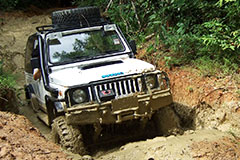Get True Off-Road Experience with a True SUV - Vol.372
One of the most popular categories of cars is Sport Utility Vehicles. Whether it's the size or off-road capabilities, these large vehicles are popular with consumers who increasingly prefer them to the more traditional station wagons, or even minivans. But not all SUVs are created equal. They may look like they can handle off-road driving, but the fact is, a lot of them are just basically enlarged hatchbacks. Of course, this is not necessarily a bad thing, if your driving style doesn't require going off-road that much.

All Style, No Substance?
A lot of modern SUVs can't really handle being off-road that much. Sure, they may look like proper off-road vehicles, but their ground clearance just isn't high enough to allow something like that. Furthermore, they may not even be equipped with all-wheel drive, which is essential if you get stuck in a particularly tricky situation outdoors. Sometimes, a vehicle might not even be called an SUV, but instead, the manufacturer will use the term crossover, which should tell you that it's a pretty versatile vehicle, but not one you should buy if you're serious about off-road driving. Still, such cars are still better at handling some minor obstacles compared to compacts and hatchback, so they're still a great choice.
True SUVs Do Exist
You've probably heard that, if you want to drive off-road, you need a "true" SUV. And that's certainly correct, but what does that exactly mean? Well, one of the first things that you might notice about true SUVs is just their sheer size. Once you've seen a huge car, you know it means business. They are built with tougher materials that can handle the rough ride, and the design is usually more utilitarian. They are always equipped with 4-wheel drive (or all-wheel drive), and heavy trailers can be attached to them. True SUVs can handle bigger weights, both in terms of a number of passengers, as well as the cargo, the latter being inside the car or in a trailer. But one of the more important things that separates true SUVs from crossover vehicles is their construction.
Body on Frame vs. Unibody
Sure, just by looking at the size of the vehicles, you might be able to distinguish between real SUVs and crossovers, but there's one thing that will definitely tell you if a vehicle is a true SUV, and that's the construction. A true SUV will always have the body-on-frame construction, which means that the body and frame are two separate pieces. This type of design gives these vehicles better off-road and hauling capabilities, which is one of the things people are most interested in when it comes to these vehicles. This is because they are more resistant to twisting forces that occur when driving off-road.
The drawback of true SUVs with the body-on-frame construction is that it adds weight to the vehicle, resulting in higher fuel consumption. Handling and cornering are also affected, however, drivers of true SUVs are usually not concerned with driving fast anyway, so it may not be a huge problem anyway.
The fuel consumption is a real problem, though, and that's where the unibody construction shines. It provides better fuel mileage, as well as a smoother ride. A lot of car manufacturers have switched to the unibody construction, which proved quite popular with the consumers. However, there are companies such as Toyota, Ford, Chevrolet, and Jeep, which still offer true SUVs capable of handling (almost) any off-road situation. So, there's definitely a choice. If you're serious about off-road driving, then it's clear - get a real SUV with a body-on-frame construction. For all other, more everyday uses, a crossover will do just fine.